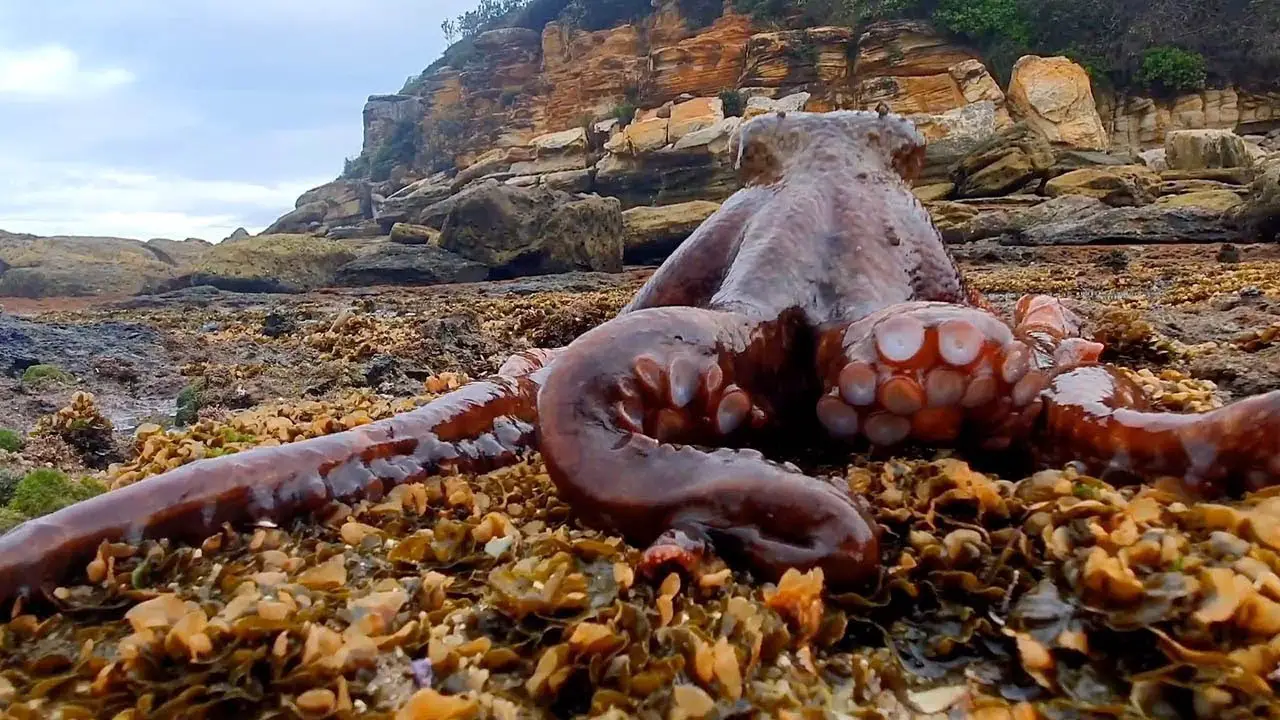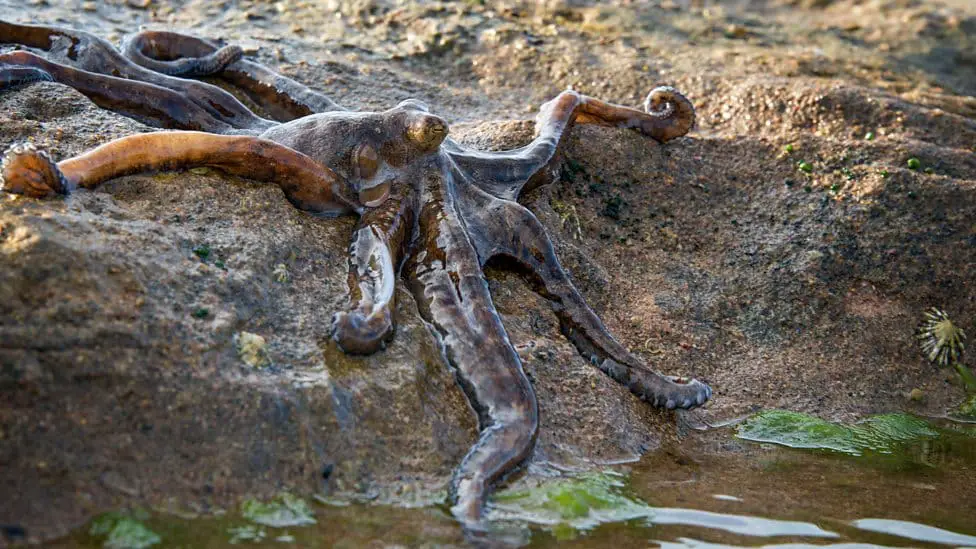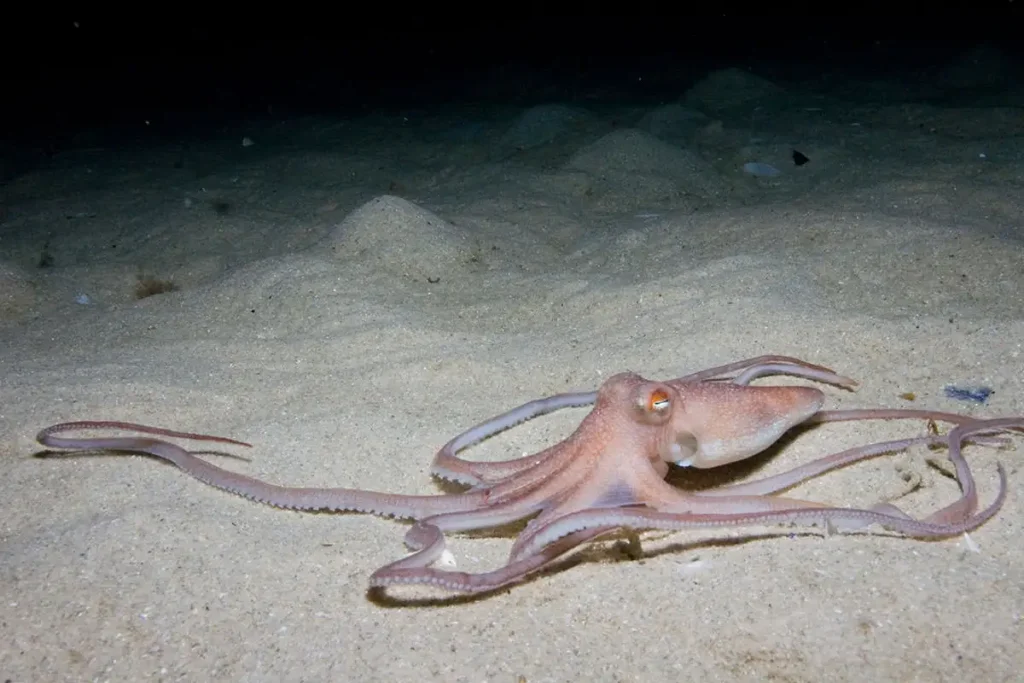Can Octopus Live On Land

Introduction
Can Octopus Live On Land: Octopuses live, with their otherworldly appearance and remarkable intelligence, have long fascinated scientists and nature enthusiasts alike. These creatures, known for their astonishing adaptations to underwater life.
Traditionally, octopuses are considered marine animals, exquisitely adapted to a life beneath the waves. They possess a highly developed nervous system, keen problem-solving abilities, and an impressive array of defensive and predatory tactics. Yet, their transition from water to land, a realm vastly different from their natural habitat, remains a subject of scientific inquiry and curiosity.
In recent years, there have been anecdotal accounts and intriguing experiments suggesting that octopuses might have the potential to survive briefly on land, challenging our understanding of their physiological limits. These tantalizing glimpses into octopus behavior beyond the water’s edge have opened up a world of questions about their adaptability, resilience, and the possible implications for their future in a changing environment.

How long can octopus live on land?
Like fish, octopuses need water to survive, and take in oxygen through their gills. But marine biologist Ken Halanych told Vanity Fair that octopuses can survive for around 20-30 minutes outside the water.
Octopuses are highly adapted to life in the water, possessing remarkable abilities for swimming and hunting beneath the waves. However, their survival on land is severely limited due to their reliance on gills for respiration. Unlike fish, octopuses do not have a protective bony structure to support their bodies, which makes it difficult for them to withstand the pull of gravity outside of water. When stranded on land, an octopus is at risk of desiccation, or drying out, which can lead to irreversible damage to its delicate tissues.
Under optimal conditions, an octopus might manage to survive on land for a short period, typically ranging from a few minutes to an hour. This window of survival is highly contingent on factors such as temperature, humidity, and the individual octopus’s overall health. Some species of octopuses possess a limited ability to crawl short distances on land, using a combination of muscular contractions and water expulsion through their siphon to inch along. However, this is more of a survival mechanism than a sustainable mode of locomotion.
While octopuses are incredibly adapted to life underwater, they are ill-suited for extended periods on land. Their physiology and respiratory system are intricately tied to the aquatic environment, making it imperative for them to return to the safety of the sea as soon as possible.
Can octopus survive in land?
In moist, coastal areas it is believed they can crawl on land for at least several minutes. Mostly they go from pool to pool, never staying out of the water for extended periods. If faced with a dry surface in the sun, they will not survive for long (source: Scientific American).
Octopuses are primarily marine creatures, exquisitely adapted for life in the ocean. Their survival on land is severely limited due to their unique respiratory system. Unlike terrestrial animals, octopuses lack lungs and rely on gills to extract oxygen from water. When out of water, their gills quickly become ineffective, leading to a rapid decline in oxygen levels.
While some species have evolved limited abilities to move short distances on land using a combination of crawling and expelling water through their siphon, this is a survival mechanism rather than a sustainable lifestyle. It allows them to escape immediate threats but does not enable prolonged survival.
Desiccation, or drying out, poses a significant risk to octopuses on land. Their soft bodies are not equipped to retain moisture like land-dwelling organisms, making them susceptible to tissue damage. Additionally, the lack of buoyancy on land places strain on their delicate structures, potentially leading to injury.
Is A octopus a land animal?
An octopus is a marine animal that has a soft rounded body with eight long flexible arms about its base which have sucking disks able to seize and hold things (as prey). The octopus is an invertebrate, meaning that it does not have a backbone.
It is exclusively adapted to life in the ocean. Octopuses are classified as cephalopods, a group of highly specialized marine creatures. They possess a range of unique features that are tailored to their underwater habitat.
One of the key distinctions between octopuses and land animals is their respiratory system. Octopuses respire through gills, extracting oxygen from water. This adaptation allows them to thrive in aquatic environments but renders them ill-suited for life on land. In fact, extended exposure to air can lead to rapid desiccation, causing severe harm to their sensitive tissues.
Octopuses lack the structural framework necessary for terrestrial locomotion. Unlike animals with limbs designed for walking or running, an octopus’s appendages are specialized for swimming and manipulating objects underwater. While they may exhibit limited mobility on land through crawling movements, this is a survival mechanism rather than a sustainable means of locomotion.
The biology and physiology of an octopus are uniquely tailored to its life in the ocean. While it may have brief interactions with land in certain situations, it is unequivocally an aquatic creature, unable to thrive or survive indefinitely outside of its natural underwater habitat.
Can octopus be a pet?
“One study revealed that octopuses in small tanks outfitted with flowerpots, stones, beads and shells still showed signs of distress and even self-mutilation. Your average fish tank setup probably isn’t going to cut it.” Octopuses are not bred for captivity or companionship. They’ve never been domesticated.
While some individuals with extensive knowledge of marine biology and access to specialized equipment have successfully maintained octopuses in captivity, it is a challenging task that requires a deep understanding of their specific needs and behaviors. Octopuses are highly intelligent and have complex physical and mental requirements.
They need a large, well-maintained aquarium with a suitable substrate and hiding spots. Water quality, temperature, and salinity levels must be meticulously regulated. Additionally, they are skilled escape artists, capable of slipping through even the tiniest openings, making secure enclosure design imperative.
Feeding an octopus presents another significant challenge. They have specific dietary needs and can be picky eaters. Live prey, such as crabs or shrimp, are often required, which can be difficult to source and may raise ethical concerns for some owners.
Octopuses have relatively short lifespans, typically ranging from one to two years, which can be emotionally challenging for a pet owner. Their advanced cognitive abilities also mean they require mental stimulation and a stimulating environment.
Is it safe to touch an octopus?
But the bright blue coloring says as boldly as it can: don’t touch, I’m toxic. Blue-ringed octopuses can kill humans by biting and injecting venom. They bite when they feel threatened, and since we’re so much bigger than they are, humans are certainly threatening!
Touching an octopus should be approached with caution and respect for the animal’s well-being. While octopuses are not inherently aggressive, they have sensitive skin and can be easily stressed or injured by handling. Additionally, some species possess specialized structures called chromatophores that allow them to change color and texture, and excessive touching can disrupt this natural behavior.
Certain octopus species may also have venomous bites, though they are not considered dangerous to humans. However, attempting to touch or handle an octopus may startle or agitate it, increasing the likelihood of defensive behaviors.
In professional settings, trained marine biologists and aquarists may handle octopuses for research or care purposes, but even they do so with great care and under controlled conditions.
If you encounter an octopus in the wild, it is best to observe from a respectful distance and avoid any attempts to touch or disturb it. In aquariums or other educational settings.
Do octopuses ever come out of the water?
Octopuses are primarily marine animals, highly adapted to life in the ocean. While they spend the majority of their lives submerged, there are instances where they may briefly come out of the water. Some species of octopuses, particularly those found in intertidal zones, have developed the ability to tolerate short periods of exposure to air. They may venture onto rocky shores or tide pools during low tide in search of food or to escape predators.
During these brief excursions onto land, octopuses employ a combination of crawling movements and water expulsions through their siphon to navigate and breathe. However, it’s important to note that their time out of water is limited and heavily dependent on factors like temperature, humidity, and the individual octopus’s health.
Despite this adaptation, an octopus’s physiology is still fundamentally suited to an aquatic environment. Extended exposure to air can lead to desiccation, which can be harmful or even fatal. Therefore, while octopuses may come out of the water on occasion, they are fundamentally aquatic creatures, and their survival is contingent upon returning to their natural marine habitat as soon as possible.
How do octopuses breathe, and why can’t they live on land?
Octopuses are marvels of aquatic adaptation, but their respiratory system is intricately tied to their underwater habitat. Unlike humans, who rely on lungs to breathe air, octopuses employ gills to extract oxygen from water.
Octopuses breathe through a network of gills located inside their mantle, the bulbous part of their body. Water enters the mantle cavity, and the gills extract oxygen from it while simultaneously removing carbon dioxide. This specialized system is efficient for extracting dissolved oxygen from the surrounding water, enabling octopuses to thrive in their native marine environment.
The key reason octopuses can’t survive on land is their dependence on water to facilitate respiration. Unlike amphibious creatures that have evolved specific adaptations for terrestrial life, octopuses lack the means to extract oxygen from air effectively. On land, their delicate gills would quickly desiccate and lose their functionality, leading to rapid suffocation.
Octopuses’ bodies lack the structural support required for efficient movement on land. Their soft, pliable bodies are optimized for a buoyant, liquid environment, making terrestrial locomotion highly impractical.
Octopuses’ unique respiratory system, tailored for extracting oxygen from water, restricts their ability to survive on land. Their physiology and biomechanics are finely tuned to the underwater world, highlighting the stark contrast between their incredible adaptations to the ocean and their unsuitability for life outside of it.
Are there any species of octopuses that are more tolerant of being out of water?
While most octopus species are highly adapted for life in the water and cannot survive for extended periods on land, there are a few exceptions that demonstrate greater tolerance to being out of water. Notable among these exceptions is the common Sydney octopus, Octopus tetricus.
The Sydney octopus is often found in tide pools and intertidal zones along the coast of Australia, where it experiences regular exposure to air during low tide. To cope with these conditions, this particular octopus species has developed several adaptations. One of the most striking is its ability to hold water in its mantle cavity, which can help prevent desiccation and allow the octopus to stay moist during brief periods out of water.
Additionally, the Sydney octopus exhibits behaviors such as burying itself in the sand or seeking refuge in crevices during low tide to minimize exposure to air. These adaptations showcase the species’ remarkable ability to endure short excursions onto land.
While the Sydney octopus is one of the more tolerant octopus species when it comes to being out of water, it’s important to note that even this species has its limits. Prolonged exposure to air can still be detrimental to its health, emphasizing that octopuses, in general, remain predominantly aquatic creatures with specialized adaptations for life beneath the waves.

Conclusion
We find ourselves at a juncture where the mysteries of these enigmatic creatures continue to unfold. While octopuses live are indisputably marine animals, their occasional ventures onto land, although brief, highlight their extraordinary adaptability and problem-solving capabilities.
The experiments and observations conducted in recent years have revealed that octopuses can tolerate short periods on land, primarily facilitated by their remarkable ability to breathe air and use their flexible bodies for limited locomotion. These findings challenge conventional wisdom and underscore the resilience of these oceanic beings.
However, it’s crucial to recognize the limitations of these excursions. Octopuses are not terrestrial creatures, and prolonged exposure to the harsh conditions of land remains lethal to them. Their adaptations to life in water, including buoyancy control and protection from desiccation, are essential for their survival.
While octopuses may exhibit an astonishing degree of adaptability and curiosity, land is not their natural habitat. Their true mastery lies beneath the waves, where they thrive as masters of the ocean. Understanding their land-based behaviour enriches our knowledge of these remarkable animals and emphasises the importance of protecting their oceanic homes as we continue to explore the limits of their extraordinary capabilities.



